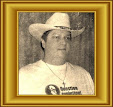Addendum added later the same day as published.
As any rancher worth his salt knows, you can have a hybrid animal such as a mule (offspring of a horse and donkey). It will likely suit your purpose, but critters like this are not likely to spread life. The same can be said for hybridized accounts of creation that mix the Bible and millions of years.
Some folks reject the Bible's authority. We expect that from atheists and other non-believers, but there are professing Christians who also downplay the Word of God. Scripture plainly says that everything was created in six days. Instead of humbling themselves and submitting to Christ, they light a shuck out of there and head for the comfort of riding the owlhoot trail. They are degrading Scripture.
Why would a supposed believer want to compromise? It seems to me that these owlhoots don't want to look like one of those people who reject deep time, so they seek the praise of men rather than God. Another reason is that they want to accommodate atheistic views of science and their interpretations of evidence so they can allow for evolution. Some of these alleged Christians get a notion to add millions of years to the Bible by pretending it doesn't mean what it clearly says. Using the right chronogenealogies and using verses in the proper context, plus some decent research, is mighty helpful.
However, the age of the earth and of the universe itself is not clearly delineated in secular science, nor is evolution. Some of Darwin's disciples fight light badgers in a burlap sack about all sorts of things, and despite the protestations of devolution atheists, evolution is not settled science.
People who try to compromise with theistic evolution, old earth creation, and hybrid creation accounts do not accomplish anything of value. Indeed, such tinhorns mock God, his people, and Scripture. Do they really believe? Their insistence on eisegesis over exegesis, ridicule of Bible-believing Christians, and giving comfort to enemies of God causes me to lack belief that they do so.
As any rancher worth his salt knows, you can have a hybrid animal such as a mule (offspring of a horse and donkey). It will likely suit your purpose, but critters like this are not likely to spread life. The same can be said for hybridized accounts of creation that mix the Bible and millions of years.
 |
| Credit: Library of Congress/Carol M. Highsmith archive |
Why would a supposed believer want to compromise? It seems to me that these owlhoots don't want to look like one of those people who reject deep time, so they seek the praise of men rather than God. Another reason is that they want to accommodate atheistic views of science and their interpretations of evidence so they can allow for evolution. Some of these alleged Christians get a notion to add millions of years to the Bible by pretending it doesn't mean what it clearly says. Using the right chronogenealogies and using verses in the proper context, plus some decent research, is mighty helpful.
However, the age of the earth and of the universe itself is not clearly delineated in secular science, nor is evolution. Some of Darwin's disciples fight light badgers in a burlap sack about all sorts of things, and despite the protestations of devolution atheists, evolution is not settled science.
 |
| The greater irony here is this "Spock" jasper is eminently illogical |
There are several different approaches to interpreting Genesis 1 and 2. Theistic evolutionists not only try and read billions of years into the text, they also allow for something that is indistinguishable from straight-up evolution and big bang ideas.To read the entire article, click on "Hybrid approaches to Creation — Is there a middle ground?" ADDENDUM: Two more articles came to my attention that I want to recommend that fit the overall theme. First, "The Gap Theory" by Dr. Jason Lisle. Second, this lengthy article (a PDF download is available) is worth the attention of those who deal with the cult-like following of Rossites, "Critical Analysis of Hugh Ross’ Progressive Day-Age Creationism Through the Framework of Young-Earth Creationism".
Progressive creationists believe that the universe is very old, that God is the creator, and that He created things in groups, occasionally, across vast periods of time. In general, they reject chemical evolution and Darwinian evolution, but totally accept cosmological and geological evolution.
Day-age theorists can be considered a subset of progressive creationists (e.g. Hugh Ross calls himself a ‘day-age creationist’ but is widely considered a ‘progressive creationist’). Most believe the universe is as old as secularists claim, but this young man did not. Instead, he thought the universe was maybe hundreds of thousands of years old.
A popular option in (respectability-craving) seminaries is the framework hypothesis, which regards the days of Genesis 1 as real days, but in a literary framework rather than real history. This theory is less than 100 years old, and the original proposers were open about trying to fit long ages (and evolution) into the Bible.
Lastly, there are the biblical creationists. This is our preferred label for CMI’s stated beliefs. [Biblical creationist is also my view, and that of many others. -Cowboy Bob]
